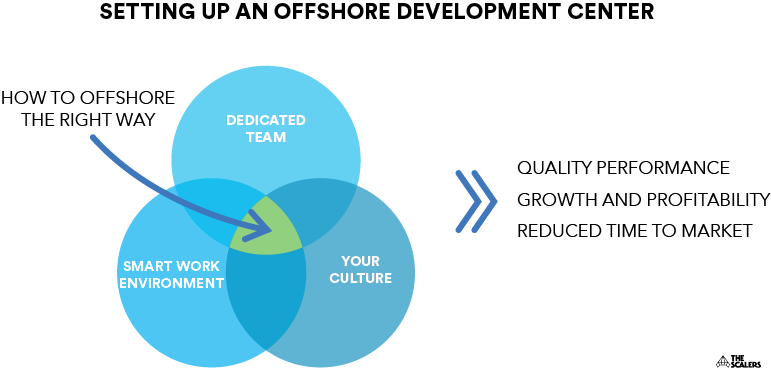There’s no doubt that the software industry has become incredibly saturated. With tech start-ups mushrooming like never before, industry experts suggest that there will be over a million software companies in the world within the next 10 years. Almost 50% of these businesses are tightly-packed into Western Europe and American cities. Competition is at an all-time high, operational costs are always climbing, and talent is getting scarcer by the day.
Offshore software development services have now risen as a solution for Western businesses that are looking to get ahead in the crowded and expensive marketplace. However, a lot of businesses still don’t know what offshore development really is. With the internet full of confusing and conflicting information, even understanding the basics of offshoring can be quite a task.
In this blog post, we break it down for you. As experts in the offshoring industry, we explain what offshoring is, what benefits it could bring to your business, and how you can offshore your software development.
TABLE OF CONTENTS
- What is offshore software development?
- When is the best time for offshore software development?
- Who should use offshore software development?
- What are the benefits of offshore software development?
- Offshore outsourcing locations: Where can you go?
- Does offshore outsourcing create an ethical dilemma?
- How can you manage your offshore software development team?
What is offshore software development?
Offshore software development is when a company opens a new office called an offshore development center in India by WeAssemble and hires a team of developers in another country. They are permanent employees just like your in-house team, except that they’re based elsewhere.

For instance, IT giants like Google, Microsoft, and Apple have all established their R&D centers in Bangalore, the Silicon Valley of Asia. The lower operating costs, massive talent pool, and the opportunity to scale quickly allows them to increase their output and improve their technical expertise, without undue stress, hassle, or cost.
Simply put, offshoring means expanding your business with a new team of skilled employees who are geographically distant from your in-house team.
Read More Difference between Onshoring, Outsourcing, Offshoring & Nearshoring
When is the best time for offshore software development?
Your operational costs are getting out of hand
Engineers are the most highly-paid workforce in the world today. Research conducted by The Engineer in 2018 shows that the average salary of an engineer in the UK is roughly 48,000€. With employee wages accounting for more than half of the fixed costs of an average business, hiring local talent in the West means having to pay through your nose. And that’s just the payroll!
Add employee-centric benefits such as travel allowance, insurance, and yearly bonuses to the equation, and your operational costs are through the roof. Instead, by starting offshore development, you can save a significant amount of money, and increase your margins, without compromising on your output.
You’re not scaling fast enough
No business wants to be in a position where they have to turn away profit-generating, growth-enabling business because they don’t have the internal capacity to accommodate them. However, without the right tech team in place, it’s quite likely to happen.
If you’re looking for a long-term solution, then outsourcing your software development to an external vendor isn’t going to work. You want to scale your team, and it needs to be done fast. This is where an offshore development model can prove to be invaluable.
By starting offshore development, you gain access to a massive pool of qualified engineers who aren’t outsourced help, but a value-adding extension of your business. They will be a part of your business for years going forward, enabling you to take on more projects and generate higher profits. And because the talent pool in countries like India is huge, you don’t ever have to worry about talent scarcity either.
Who should use offshore software development?
Typically, offshore software development is leveraged by service-based companies whose core business is non-technical. These are businesses that are experts in their respective industries but are unable to keep up with the ever-changing technology. It can be something as simple as transforming their existing website, or a complex project such as developing a value-adding digital product for their customers.
However, because of their lack of expertise in all things software, their technology is not cutting edge and requires a lot of developers to maintain and build. With local engineers costing well over €50 an hour, offshoring is a neat solution where they can hire developers full time and at a fraction of the cost. The offshore development teams they build can also help implement new ideas further down the line.

In other cases, companies may already have an in-house development team but are unable to scale up and take on bigger contracts. They want to increase the value of their business and grow with the times but are struggling to. Since new developers are expensive and hard to find, a dedicated offshore team might be an ideal solution.
Does offshoring work for one-off projects?
Because the offshore team that you build are permanent employees, if you’ve got a one-off project, partnering with an outsourcing vendor might be the better move.
What are the benefits of offshore software development?
Undoubtedly, going offshore isn’t a small move. It’s a significant strategic move, which means that the benefits must be tangible for your business. So, what are the benefits of offshore software development?
Access to engineering talent
The primary reason why hiring engineers in Western countries is so expensive is that their skills are incredibly in demand. For instance, in the US alone, there are over 250,000 software engineering jobs that are currently unfilled – a number that is only increasing. There just aren’t enough talented developers to fill the gaps.
Even though colleges in the West are pushing IT courses, there’s still going to be an inevitable delay before those graduates are experts in the industry. And that’s why, today, the main reason companies are looking to build offshore teams and engage developers in countries like India doesn’t cost – it’s availability.
India produces 1.5 million engineering graduates every year. Thanks to the high training pedigree and extensive English language training, these engineers roll out of university ready to work. Indian engineers can not only communicate with general fluency in the English language but can also be extremely clear and concise in a highly technical environment.
Lower costs of operation
A lot has been said and done about “lower” costs when discussing the pros and cons of offshore software development. But, let’s get more specific.
Say you establish a development team in Bangalore, along with your in-house team at home in London. When you compare the salaries only, the salary of the average developer in Bangalore is comfortably 3-4 times cheaper than in London. That means that the total cost of doing business in Bangalore, including premises, administrative staff, legal work, payroll, developer salaries, etc., typically comes in at 50% the cost of your at-home developers’ salaries.
The reason – a lower cost of living. The cost of living in India is at least 3 or 4 times lower than in the West. A higher disposable income means that you’re paying significantly lesser to cash in the same, if not better expertise as back home.

The opportunity to scale quickly
Taking on new, skilled, expensive employees is an investment that presents a significant financial risk. If those employees decide to leave early, you could be overburdened with work, the quality of the software you develop drops, and before you know it, your clients are going elsewhere.
However, with an offshore team, this crisis can be averted. First, the cost of recruiting and paying staff is lower. Thanks to the reduced payroll, a business could shoulder down periods more easily with an offshore team. At the same time, expanding your offshore team can be done much faster than in-house. For instance, The Scalers have brought multiple groups of engineers to our clients’ teams in as little as 4 weeks. Vetted, tested, and ready for work.
Read more to know about offshore software development.
Source:https://thescalers.com/offshore-software-development-definite-guide-for-ceo/